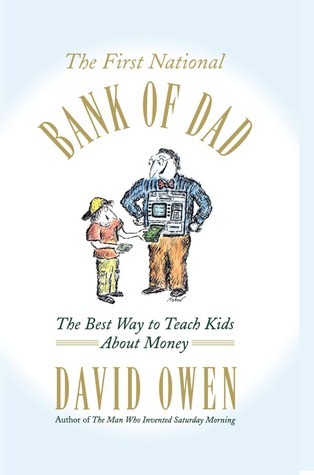What do you think?
Rate this book


David Owen, a New Yorker staff writer and the father of two children, has devised a revolutionary new way to teach kids about money. In The First National Bank of Dad, he explains how he helped his own son and daughter become eager savers and rational spenders. He started by setting up a bank of his own at home and offering his young children an attractively high rate of return on any amount they chose to save. "If you hang on to some of your wealth instead of spending it immediately," he told them, "in a little while, you'll be able to double or even triple your allowance." A few years later, he started his own stock market and money-market fund for them.
Most children already have a pretty good idea of how money works, Owen believes; that's why they are seldom interested in punitive savings schemes mandated by their parents. The first step in making children financially responsible, he writes, is to take advantage of human nature rather than ignoring it or futilely trying to change it.
"My children are often quite irresponsible with my money, and why shouldn't they be?" he writes. "But they are extremely careful with their own." The First National Bank of Dad also explains how to give children real experience with all kinds of investments, how to foster their charitable instincts, how to make them more helpful around the house, how to set their allowances, and how to help them acquire a sense of value that goes far beyond money. He also describes at length what he feels is the best investment any parent can make for a child -- an idea that will surprise most readers.
208 pages, Hardcover
First published January 7, 2003
I had also forgotten that, to a kid, “long term” does not mean “long term”—it means “never.”
Most children immediately realize that banking plans implemented by their parents are actually punitive in intent: their true purpose is not to promote saving but to prevent consumption.
Most important of all, I realized that up until that moment almost all of my efforts to teach my daughter financial responsibility had consisted of reducing or eliminating what few financial responsibilities she had. How could she possibly learn anything about handling money if I was just going to keep dreaming up new excuses for taking money out of her hands? Don’t we learn about money the way we learn about anything else—by making a series of gradually less horrible mistakes and living with the consequences?
The mistake most parents make, I think, is to blur the boundary between their own money and that of their children, to the point where the children can only be irresponsible and annoying. If your own income consisted solely of what you were able to beg from a fickle and inscrutable boss, then you would wheedle, too. Children who have no control over their own funds have no incentive not to plead for money and then to squander every dollar that comes into their hands.
Having real control of their own money forces children to confront and weigh their actual desires. It also frees parents from having to play an invariably judgmental and adversarial role in the family economy.
One of the most useful services that we can provide as parents is to provide our kids with opportunities to screw up in interesting ways that make lasting impressions but do no genuine harm.If you want to let your child learn about money with the money you give them, you should let them have meaningful control over it. You don't "strongly suggest" that they save; you don't prate about how fulfilling it is to give to charity; you let them buy whatever they want [parental permission is sought or applies only to purchases that significantly trespass upon house/safety rules] — as a bonus, that means you don't have to waste energy every time they want to make a purchase.